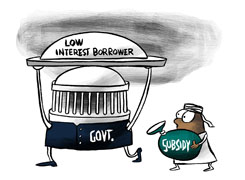Ramalingam Kalirajan |7720 Answers |Ask -Follow
Mutual Funds, Financial Planning Expert - Answered on May 23, 2024
He has an MBA in finance from the University of Madras and is a certified financial planner.
He is the director and chief financial planner at Holistic Investment, a Chennai-based firm that offers financial planning and wealth management advice.... more

I want to take a car loan of 9 lacs from Union Bank of India for 5 years. My cibil is 800 and Union bank is offering 8.70% rate of interest. After everything processed they released sanction letter, it is observed they have given 9% rate of interest and plan for 7 years. And now they want to settle it by paying extra 0.30% rate of interest on my loan account to fix this. And they will reduce years by 5 years using ECS(I don't know exact term). Should I go with their solution? Will it be wise decision?
Understanding the Situation
You are considering a car loan of Rs. 9 lakhs from Union Bank of India for 5 years. With a CIBIL score of 800, you were initially offered a rate of interest of 8.70%. However, the sanction letter shows a rate of 9% and a tenure of 7 years. The bank proposes to fix this by reducing the tenure to 5 years and compensating with an extra 0.30% interest. Let’s evaluate whether accepting this offer is wise.
Genuine Compliments and Understanding
You have a commendable CIBIL score of 800, reflecting responsible credit management. This score should ideally provide you leverage in negotiating better loan terms.
Assessing the Interest Rate
Initial Offer vs. Sanctioned Rate
The initial offer was an 8.70% interest rate for a 5-year term. The sanctioned letter reflects a 9% rate over 7 years. This discrepancy is concerning and warrants a closer examination.
Proposed Solution: Additional 0.30% Interest
The bank proposes to adjust the term to 5 years and apply an extra 0.30% interest rate. This brings the total interest rate to 9.30%. This needs careful consideration.
Evaluating the Loan Tenure
Shorter Tenure Benefits
A 5-year tenure is preferable as it reduces the total interest outgo. Paying off the loan faster can save you a significant amount in interest.
Impact of a 7-Year Tenure
A 7-year tenure, though reducing the EMI burden, increases the total interest paid over the loan period. This is not ideal for long-term financial health.
Impact of Extra 0.30% Interest
Cost Implications
The proposed additional 0.30% interest rate increases the total cost of the loan. This needs to be evaluated against potential alternatives.
Negotiation Leverage
With your strong CIBIL score, you have leverage. Consider negotiating for the originally promised 8.70% interest rate without any additional percentage.
Practical Steps Forward
Communication with the Bank
Communicate clearly with the bank. Highlight the initial offer and your CIBIL score. Request adherence to the original terms.
Alternative Lenders
Explore other banks or financial institutions. They may offer better terms given your strong credit profile.
Importance of Clarity and Documentation
Document Review
Thoroughly review all loan documents before signing. Ensure that the terms reflect what was agreed upon.
Seek Professional Advice
Consider consulting a Certified Financial Planner. They can provide personalized guidance based on your financial situation.
Managing Loan Repayment
Efficient EMI Payments
Ensure your EMI payments are manageable within your monthly budget. Avoid any strain on your finances.
Prepayment Options
Check for prepayment options without penalties. This can help in reducing the overall interest burden.
Balancing Immediate Needs and Long-term Goals
Immediate Financial Stability
Ensure that the loan repayment does not compromise your immediate financial needs. Maintain an emergency fund.
Long-term Financial Goals
Keep your long-term financial goals in sight. Ensure that taking this loan does not derail other important financial plans.
Conclusion
Given the discrepancy between the initial offer and the sanctioned terms, it is wise to reconsider the proposed solution. Communicate with the bank to seek better terms or explore alternative lenders. Ensure that any loan taken aligns with both your immediate financial stability and long-term goals.
Best Regards,
K. Ramalingam, MBA, CFP,
Chief Financial Planner,
www.holisticinvestment.in
You may like to see similar questions and answers below
Harsh Roongta | Answer |Ask -Follow
Answered on Dec 24, 2019
Ramalingam Kalirajan |7720 Answers |Ask -Follow
Mutual Funds, Financial Planning Expert - Answered on Aug 13, 2024
Ramalingam Kalirajan |7720 Answers |Ask -Follow
Mutual Funds, Financial Planning Expert - Answered on Aug 23, 2024
Prof Suvasish Mukhopadhyay |340 Answers |Ask -Follow
Career Counsellor - Answered on Jan 30, 2025
Prof Suvasish Mukhopadhyay |340 Answers |Ask -Follow
Career Counsellor - Answered on Jan 30, 2025
Prof Suvasish Mukhopadhyay |340 Answers |Ask -Follow
Career Counsellor - Answered on Jan 30, 2025
Shalini Singh |144 Answers |Ask -Follow
Dating Coach - Answered on Jan 30, 2025
Prof Suvasish Mukhopadhyay |340 Answers |Ask -Follow
Career Counsellor - Answered on Jan 30, 2025
Prof Suvasish Mukhopadhyay |340 Answers |Ask -Follow
Career Counsellor - Answered on Jan 30, 2025
Shalini Singh |144 Answers |Ask -Follow
Dating Coach - Answered on Jan 30, 2025
Prof Suvasish Mukhopadhyay |340 Answers |Ask -Follow
Career Counsellor - Answered on Jan 30, 2025
Prof Suvasish Mukhopadhyay |340 Answers |Ask -Follow
Career Counsellor - Answered on Jan 30, 2025
Ravi Mittal |516 Answers |Ask -Follow
Dating, Relationships Expert - Answered on Jan 30, 2025
























